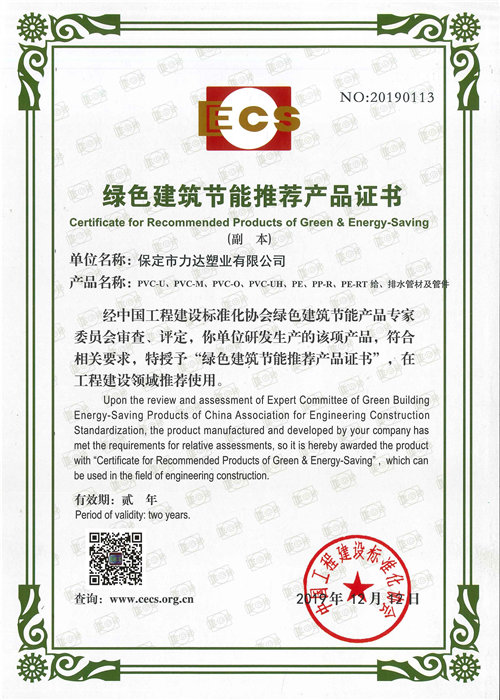Nov . 09, 2024 04:26 Back to list
Choosing the Right PVC Pipes for Efficient Water Supply Systems
Advantages of PVC Water Supply Pipes
Polyvinyl chloride (PVC) pipes have become increasingly popular in various plumbing applications, especially for water supply. Their unique properties and advantages have made them a preferred choice for both commercial and residential projects. This article explores the benefits of using PVC pipes for water supply, highlighting their durability, cost-effectiveness, and environmental impact.
Durability and Longevity
One of the most significant advantages of PVC pipes is their durability. Unlike traditional materials like metal or concrete, PVC is resistant to corrosion and rust. It is not susceptible to the wear and tear frequently seen in older plumbing systems. This resistance extends the lifespan of PVC pipes, often exceeding 50 years with proper installation and maintenance. Additionally, PVC can withstand extreme temperatures and pressures, making it suitable for a variety of environments, from frigid climates to hot regions.
Cost-Effectiveness
When it comes to budget considerations, PVC pipes are a cost-effective option for water supply systems. The initial material cost of PVC is typically lower compared to alternatives such as copper or steel. Furthermore, the installation process is simpler and quicker, often requiring less labor. The light weight of PVC makes it easier to transport and handle, reducing overall installation costs. Over time, the longevity of these pipes also leads to lower maintenance costs, providing a significant overall cost advantage.
Lightweight and Easy to Install
pvc water supply pipe

The lightweight nature of PVC pipes not only simplifies transportation but also eases the installation process. Workers can work more quickly and efficiently, which can be particularly beneficial in large-scale projects. Unlike heavy materials that require extensive manpower and machinery for handling, PVC allows for quicker and less labor-intensive installation, providing contractors with flexibility and efficiency.
Resistance to Chemicals
PVC pipes are highly resistant to a range of chemicals, including acids, salts, and bases. This property makes them ideal for various applications beyond just water supply, including agricultural irrigation and industrial piping systems. They are less likely to leach harmful substances into the water, ensuring that the water supply remains clean and safe for consumption. This resistance to chemicals ensures a lower risk of contamination, which is essential for maintaining public health standards.
Environmental Impact
Sustainability is a growing concern in the construction industry, and PVC piping offers several environmentally friendly benefits. The production process of PVC emits fewer greenhouse gases compared to alternatives such as copper or steel. Additionally, PVC pipes are 100% recyclable, reducing the amount of waste sent to landfills. As the world moves toward more sustainable practices, the use of PVC can contribute to a greener future without sacrificing quality or efficiency.
Conclusion
In summary, PVC water supply pipes offer numerous advantages that make them a leading choice for plumbing systems. Their durability, cost-effectiveness, ease of installation, resistance to chemicals, and environmental benefits position PVC as an optimal material for a variety of applications. Whether for residential, commercial, or industrial uses, adopting PVC piping can lead to improved water quality and reduced maintenance issues, ultimately resulting in better water management. As construction practices evolve and sustainability becomes increasingly prioritized, the use of PVC pipes will likely continue to grow, making them a fixture in modern plumbing solutions.
-
HDPE Natural Sheet: Durable, Food-Grade & Versatile Plastic Solutions
NewsAug.27,2025
-
Durable Glossy PVC Rigid Sheet | Premium High-Shine Panels
NewsAug.26,2025
-
Durable PP Rigid Sheet: Lightweight, Chemical Resistant Solutions
NewsAug.21,2025
-
PVC Grey Sheet for Extraction: Chemical Resistant & Durable
NewsAug.19,2025
-
Durable PVC Pipe Fittings for Plumbing & Irrigation Needs
NewsAug.18,2025
-
HDPE Steel Belt Reinforced Spiral Corrugated Pipe | High Strength
NewsAug.17,2025

